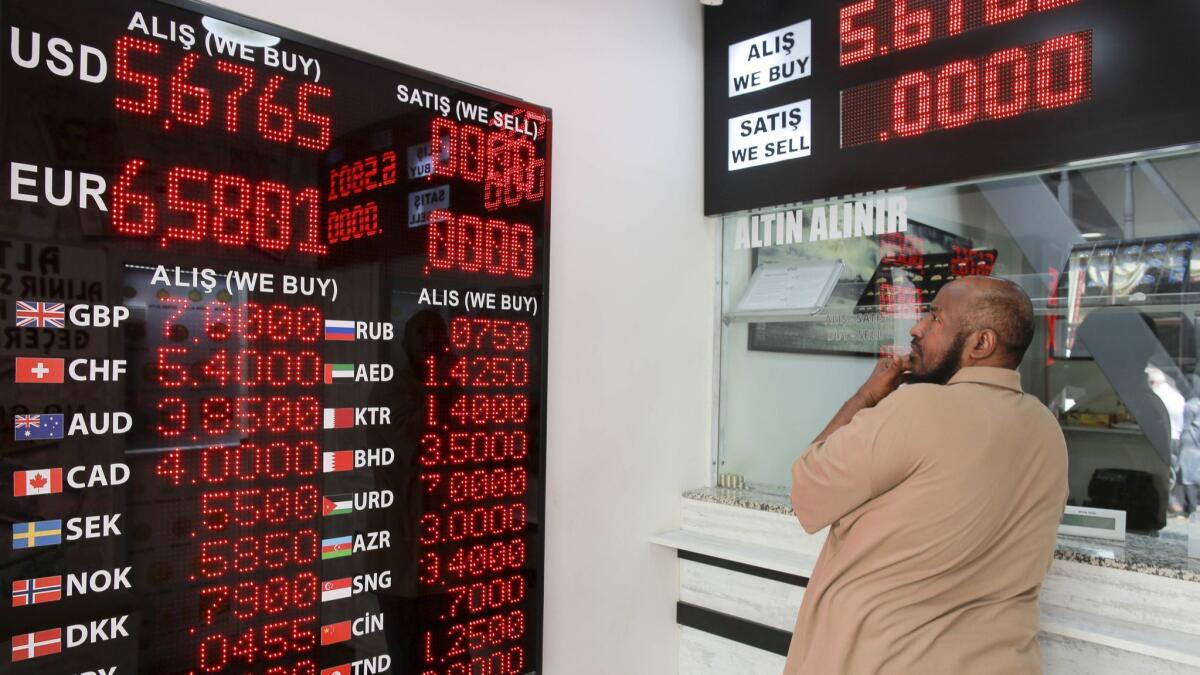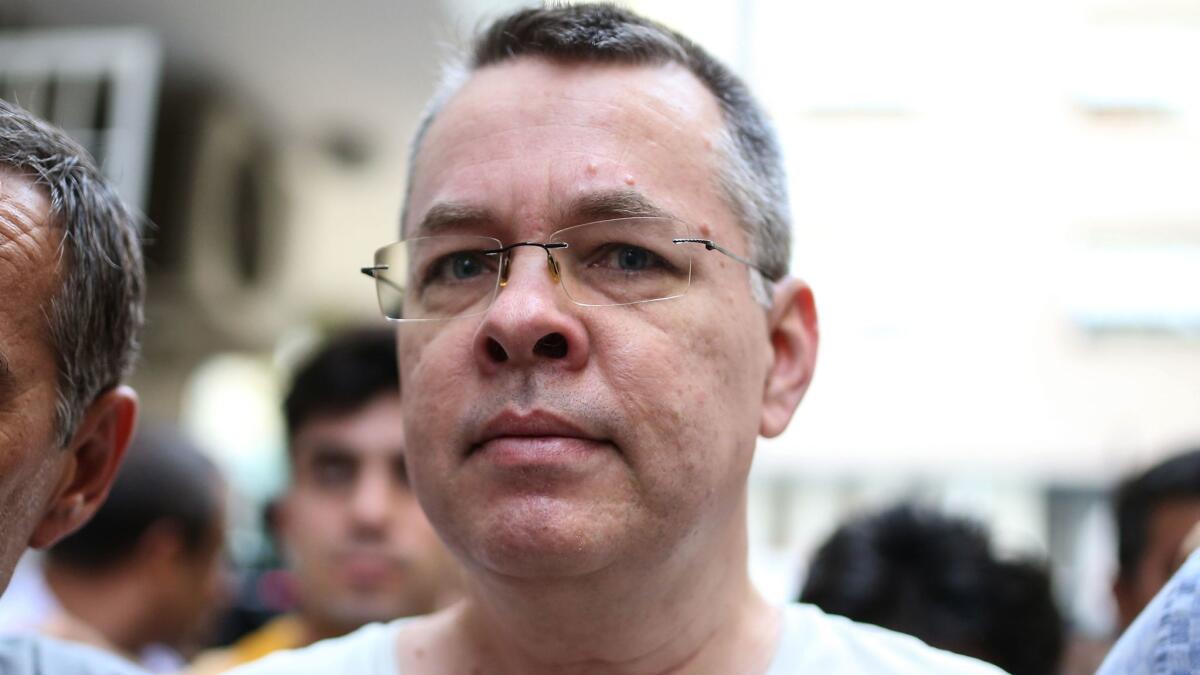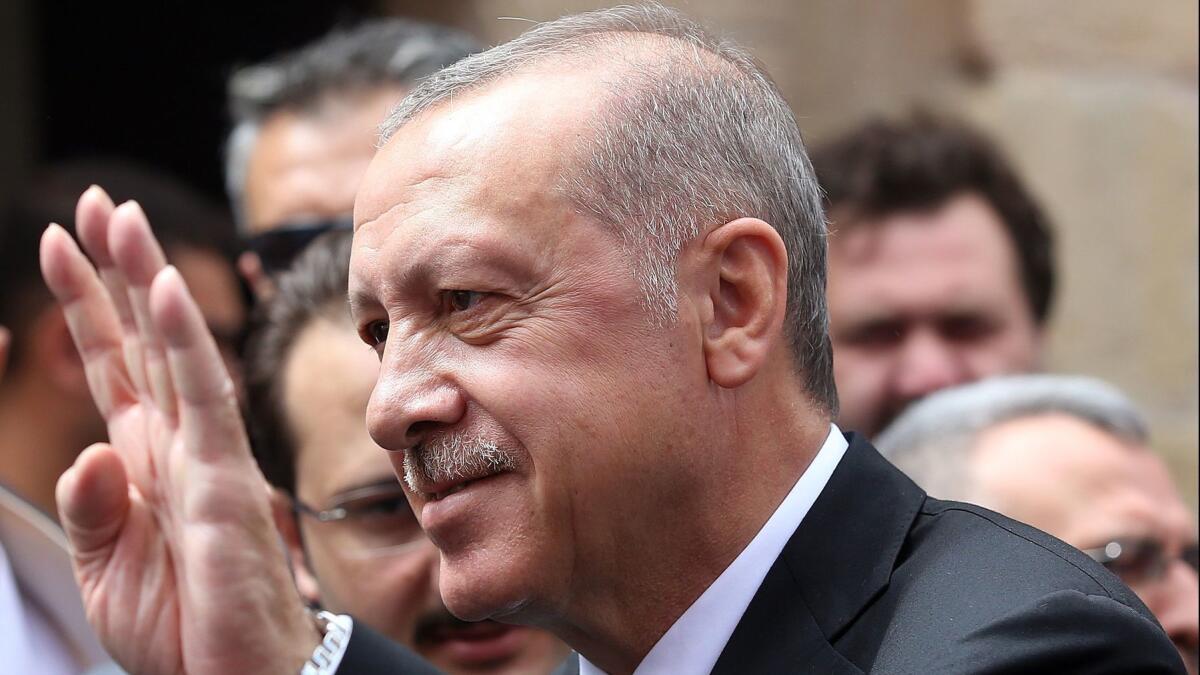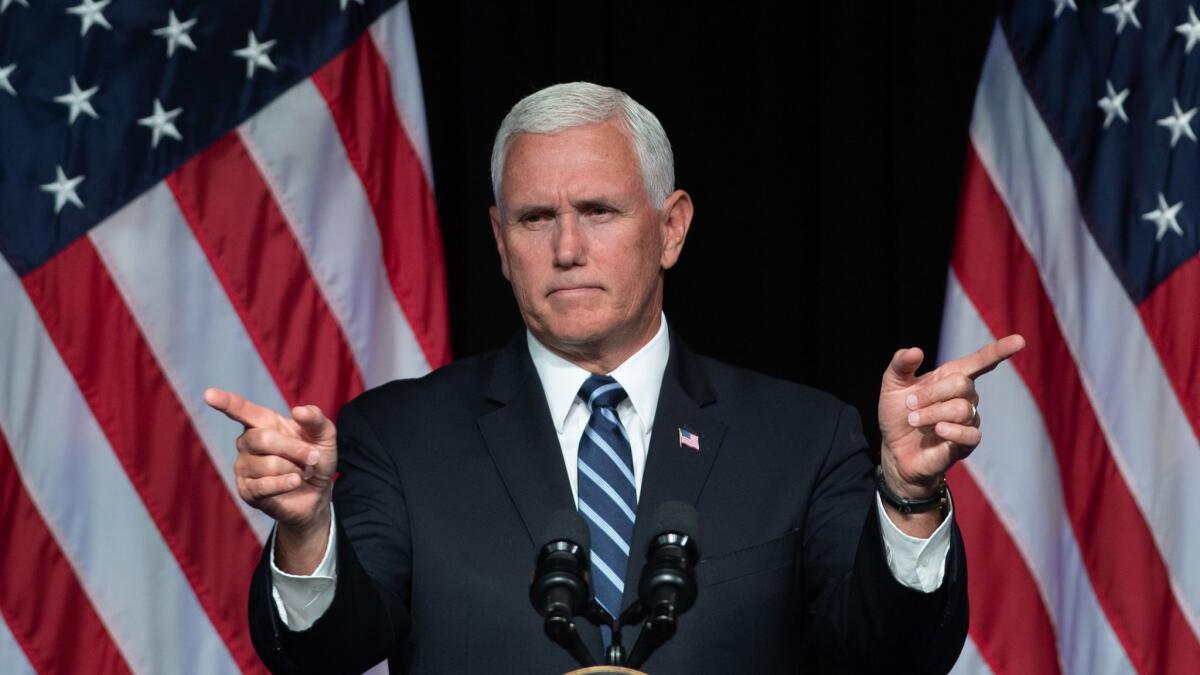Tensions increase between U.S. and Turkey over detained American pastor. Here are the players involved

- Share via
Reporting from WASHINGTON — Relations between Turkey and the United States suffered another blow Friday after President Trump announced via Twitter that he had authorized the doubling of tariffs on steel and aluminum exports from Turkey.
The deepening rift between the two NATO allies is over failed talks to release an American pastor who has been detained since 2016 on espionage charges.
Friday’s announcement comes nine days after Trump said the Treasury Department would impose sanctions on two Turkish officials. Here’s a look at the major players involved and an explanation of this geopolitical conflict:

Pastor Andrew Brunson
Brunson is an evangelical preacher who has lived in Turkey for more two decades where he ran the small Izmir Resurrection Church in Izmir, a city on the Aegean coast in western Turkey. He was swept up in a massive dragnet in 2016 and accused of espionage after a military coup failed to topple President Recep Tayyip Erdogan.
The Turkish indictment against the 50-year-old pastor alleges he tried to convert Kurds living in Turkey to Christianity and engaged in “missionary activities under the cover of providing humanitarian aid to asylum seekers.” Whether or not true, those allegations bring together two feared subjects for the Turkish government: overt Christian proselytizing and work with the Kurds, many of whom desire independence from Turkey.
Brunson, his supporters and the U.S. government maintain the charges are bogus, and Trump has described Brunson as a hostage. “The disciples of Jesus suffered in his name, now it is my turn,” Brunson said during a court appearance last month. Brunson’s church belongs to the same large evangelical umbrella as Secretary of State Michael R. Pompeo’s Kansas congregation.
Brunson is a member of the conservative Evangelical Presbyterian Church, which has hundreds of churches across the U.S. A native of Black Mountain, N.C., he has lived and worked in Turkey with his wife and children, according to the American Center for Law and Justice, a D.C.-based legal organization that has advocated for his release.
“I’ve never done something against Turkey,” Brunson said in a court hearing in April. “I love Turkey. I’ve been praying for Turkey for 25 years. I want the truth to come out.”
Brunson’s next hearing is Oct. 12. He could face 35 years in prison if convicted.
Fethullah Gulen
Gulen is the man the Erdogan’s government blames for the failed coup that unfolded on the night of July 15, 2016.
Gulen, a frail 75-year-old Turkish-born Muslim cleric who has been living in exile on a 26-acre compound in eastern Pennsylvania since the 1990s, vehemently denies any involvement in the coup.
Although he lives thousands of miles away from his home country, his teachings of Sufi Islam — a mystical branch that draws on ancient teachings — have inspired thousands of followers.
Based on Gulen’s religious, economic and political beliefs, his followers have created a global movement known as Hizmet that controls schools, companies and charities.
His critics, however, say Gulen is the head of a cult and blame him for trying to overthrow Erdogan’s government.
Relations between the U.S. and Turkey started to worsen when the U.S. refused to extradite Gulen in 2016.

President Recep Tayyip Erdogan
Erdogan began his rule in Turkey in 2003 — first as prime minister, then president — as a relatively moderate conservative, having toned down his deeper Islamic tendencies in a Muslim country that fiercely defended its status as secular. But gradually he began to expand his power, eliminating the position of prime minister, placing loyal supporters in the judiciary, seizing or closing most independent media and repressing dissent.
Tens of thousands of people were arrested or fired in the aftermath of a failed coup in 2016; Turkey had more journalists in prison than any nation in the world. All the while, Erdogan also injected more religion into in Turkey’s public life, reversing a status quo of nearly a century. He may be as talented as Trump is in brinkmanship, and he is a tough, wily negotiator. He is not above using Brunson as a bargaining chip — and driving a hard bargain, at that.
President Trump
In keeping with his affinity for autocratic leaders, Trump started out forming a cordial relationship with Erdogan. Despite the misgivings of many in the administration about the country’s human rights record, Turkey remained an important partner in the fight against terrorism.
Trump telephoned to congratulate Erdogan on his victory in a referendum last year that most observers considered a sham and a thinly veiled attempt by the president at consolidating authoritarian power. And Trump has been exceedingly friendly with Erdogan at international meetings.
But it is the case of the detained American preacher — despite being a relatively narrow issue — that has captured Trump’s attention and heightened tensions between Ankara and Washington as Trump wields his presidential powers as an economic tool. In April, Trump again took to Twitter to ask for his release: “Pastor Andrew Brunson, a fine gentleman and Christian leader in the United States, is on trial and being persecuted in Turkey for no reason. They call him a Spy, but I am more a Spy than he is. Hopefully he will be able to come home to his beautiful family where be belongs!”
One reason for Trump’s interest might be the preacher’s appeal as a cause celebre among evangelical Christians in the United States.

Vice President Mike Pence
Pence has repeatedly called for the pastor’s release and in July threatened Turkey with sanctions unless it took “immediate action” to free him.
Pence spoke passionately about Brunson in late July to a crowd at a State Department conference on religious freedom. “As we gather today there is one victim of religious persecution that bears mentioning as well,” Pence said. “He is an innocent man. There is no credible evidence against him.”
During the speech Pence revealed that he had spoken with the detained pastor and said he reassured Brunson that the Trump administration was working to secure his release. Brunson’s daughter, Jacqueline Furnari, was also in attendance and Pence addressed her in his remarks: “As I told your father yesterday … President Trump and I will continue to fight to secure your father’s full release until he is restored to your family and returns to the United States of America.”
Twitter @TracyKWilkinson
Twitter @melissaetehad
Wilkinson reported from Washington and Etehad from Los Angeles.
More to Read
Sign up for Essential California
The most important California stories and recommendations in your inbox every morning.
You may occasionally receive promotional content from the Los Angeles Times.











